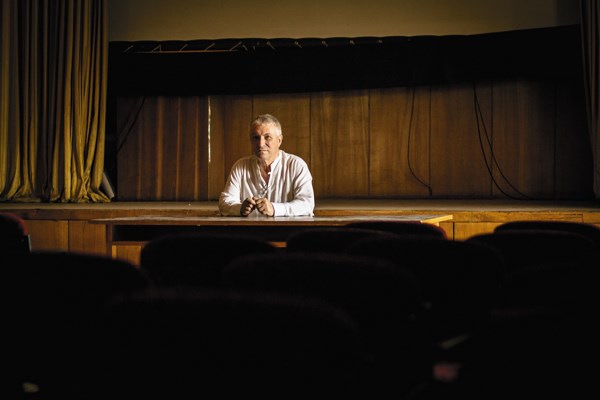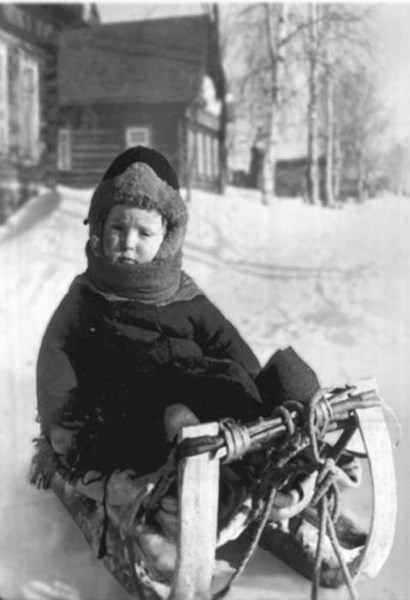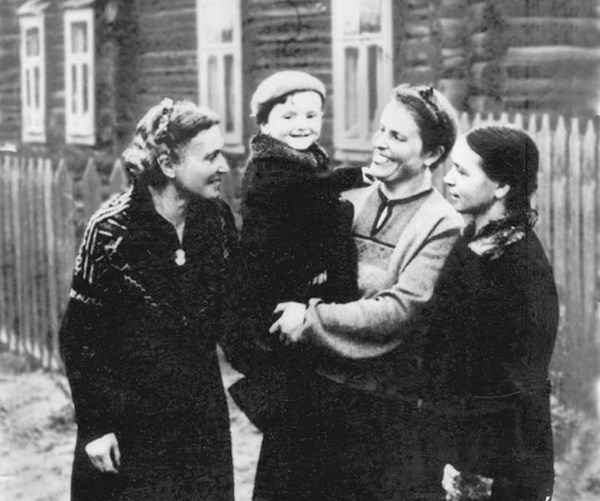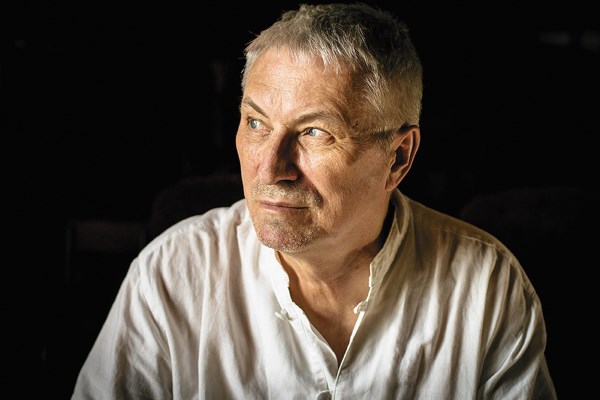![]() — Russkiy Mir Foundation — Journal — Articles — The Baptism of Joseph Brodsky
— Russkiy Mir Foundation — Journal — Articles — The Baptism of Joseph Brodsky
 The Baptism of Joseph Brodsky
The Baptism of Joseph Brodsky
Moscow writer and literary critic Vladimir Bondarenko is about to finish his work on the book about Joseph Brodsky for the popular series Lives of Remarkable People. Having travelled over the world, “chasing” Brodsky and information about him, Vladimir made his way from New York and Venice to the Vologda Region in Russia where he wanted to find the church where the future poet had been baptized.
 Joseph Brodsky lived for two years in Cherepovets, an industrial city in Northern Russia where his mother brought him at the age of 2 for the time of the Leningrad blockade. Neither the log hut where the Brodsky family lived nor the camp for prisoners-of-war where the future poet’s mother worked has been preserved. And the guide telling the tourists about the city mentions Joseph Brodsky “presumably” living there for some time. We visited several streets where, according to some sources, young Joseph lived with his mother, as well as a museum exposition devoted to Brodsky; examined the railway station which Brodsky later recalled in his interview and strolled over the grove, once home for an NKVD camp (with a brand new church now showing off at this site), where the future poet’s mother worked. As we crossed that narrow river Yagroba over a bridge, Vladimir Bondarenko told a story: “And this must be that very river which Joseph and his Mom crossed in a little boat. She was peddling and the little son asked: ‘Mom, when will we be sinking to the bottom?’ Maria Moiseyevna loved to relate this episode.”
Joseph Brodsky lived for two years in Cherepovets, an industrial city in Northern Russia where his mother brought him at the age of 2 for the time of the Leningrad blockade. Neither the log hut where the Brodsky family lived nor the camp for prisoners-of-war where the future poet’s mother worked has been preserved. And the guide telling the tourists about the city mentions Joseph Brodsky “presumably” living there for some time. We visited several streets where, according to some sources, young Joseph lived with his mother, as well as a museum exposition devoted to Brodsky; examined the railway station which Brodsky later recalled in his interview and strolled over the grove, once home for an NKVD camp (with a brand new church now showing off at this site), where the future poet’s mother worked. As we crossed that narrow river Yagroba over a bridge, Vladimir Bondarenko told a story: “And this must be that very river which Joseph and his Mom crossed in a little boat. She was peddling and the little son asked: ‘Mom, when will we be sinking to the bottom?’ Maria Moiseyevna loved to relate this episode.” Vladimir Bondarenko has authored more than a dozen books – in Soviet times he maintained correspondence with Brodsky. He believes that talking to people in the street is a no less effective scientific method than working in the archive. Taxi drivers, passers-by, companions… he told everything about the book he is working at and the church he is looking for. What if somebody knows or remembers some facts? Little information is available: it is only known that two-year-old Brodsky was baptized either in Cherepovets or nearby. A name was attached to this place by Brodsky researchers: Stepanovskoe or Stepanovo. We use our map to find two places under the name “Stepanovo” as well as Stepanovskoe. But these lie too far and do not seem to be valid places.
Finally, a middle-aged taxi driver, the third of respondents, recalls the village of Nosovskoe, 6 km away from the city. Some passengers are accustomed to calling it Stefanovskoe, although it was renamed long ago. And there is a church there. We rush there. The church is indeed standing there – a white-blue beauty bearing the name of saints Johakim and Anna. Sitting on the doorstep and washing itself is a white double-dyed tom cat with black spots. Writer Bondarenko says in exultation: “Brodsky was mad on cats, so this tom cat is a good sign.” We enter the church. Fortunately, priest Valery Belov is inside. He confirmed that this was the only church functioning in the vicinity of Cherepovets in times of the Great Patriotic war. Therefore Brodsky Joseph Brodsky could not be baptized anywhere else in 1942. While we were speaking, people bearing a baby struggled their way into the church. These locals brought the white-curled baby Svetlana to be baptized. “She is the same age Brodsky was when he was brought here,” Bondarenko whispers into my ear triumphantly. “This is another coincidence,” he says, beaming like a successful treasure hunter.
 Our discussion about Joseph Brodsky, whose life and creative work Vladimir Bondarenko has been studying for more than 30 years, took place on the bench at the entrance to the church. On that sunny day the crying of Svetlana could be heard from the church, with a black-and-white cat basking in sun rays, slumbering. God’s grace!
Our discussion about Joseph Brodsky, whose life and creative work Vladimir Bondarenko has been studying for more than 30 years, took place on the bench at the entrance to the church. On that sunny day the crying of Svetlana could be heard from the church, with a black-and-white cat basking in sun rays, slumbering. God’s grace!– Why do you think this is the very church where baby Brodsky was baptized?
– That two-year-old Joseph Brodsky was baptized during his sojourn in Cherepovets at one of the local churches the poet’s mother Maria Moiseyevna confided to her closest friend Natalia Grudinina who later made this fact public. Given the blameless reputation of both women, we have no reasons not to trust their testimony. Brodsky’s mother mentioned that the baptismal rite took place thanks to the Cherepovets nanny of little Joseph. This fact is mentioned by many biographers. Nobody ever looked for s specific church where his baptism took place, so I decided to find it and learned that there were no functioning churches in the city of Cherepovets in 1942 and there was almost none in the vicinity. Gleaming in academic studies is the name of the village where Brodsky might have been baptized: Stepanovskoe or Stefanovskoe. Not without difficulties, but we still found it. Everything coincided: liturgies in the Joachim and Anna Church were resumed in October 1942.
– It’s good that the baptismal site has been ascertained. How can it benefit the understanding of Brodsky’s life and creative work?
– In my opinion, this is a telling fact corroborating that Joseph Brodsky was a believer and an Orthodox poet throughout his life, although he never stated that directly. A careful reader will see this in his poems. Let’s take Brodsky’s Christmas verses, for example: starting in 1961 and to the end of his life Brodsky wrote poems devoted to Christmas. These could easily be his best lines full of intrinsic power. The very fact of turning to the Christmas and divine motifs is not sufficient in itself to prove the author’s Christian affiliation. God is frequently mentioned in Mayakovsky’s stanzas as well, but we feel that they were written by a convinced atheist. If we agree that Brodsky was baptized and knew about it his poems on this theme take on a different meaning, especially since a skeptical attitude towards Brodsky’s Christianity is widespread among Brodsky students who consider his Christmas verses something like fun or parody. I believe this is the key line and motif of his poetry and possibly the only thing he reflected about in earnest without a shade of irony, so inherent to him. Why didn’t he speak directly about his faith? His American surrounding mainly consisted of non-believers who probably convinced him that profound faith is not fashionable and irrelevant. Yet Brodsky was seen wearing a cross on his neck and this is a fact.
– You mention that you met Brodsky in person. Under what circumstances did you meet?
– There were several meetings including in his apartment in the famous Muruzi House on Liteyny Avenue. We were introduced to each other by Evgeny Rein, a close friend of Brodsky. Joseph had just returned from his Archangelsk exile by that time. In those days I was writing extremely avant-garde poems. Brodsky was in my eyes a hoary conventionalist and I did not feel much piety towards him, but respected him as a master of the verb and decided to show him my verses. I called him, dropped at his place and handed him a copybook. Some time later we met again and Joseph reviewed my poems, having subjected them to slashing criticism. As a matter of fact, he hated avant-garde both in poetry and fine arts. I usually take criticism cold-blooded, but Brodsky’s review produced a tremendous impression upon me. He probably told me bluntly and in a straightforward manner what I felt about my verses in the depth of my soul. He put my head straight and I quit writing poems and gradually changed for the conservative camp. After that there were several other meetings and phone talks. Our last conversation happened, when he lived in the United States. During one of my visits to America I called him and suggested a meeting, but we could not find time that would have suited us both.
– When did you begin studying the life and legacy of Brodsky?
 – I took an interest in his poetry long ago – both when his poems were published underground and when thick volumes and collections of his works saw light. After becoming a literary critic I published many articles about Brodsky’s verses and facts from his life. In parallel I visited many Brodsky-related sites. The idea of writing a book hit my mind when I was working on Lermontov reviews for the ZhZL series. I handed that study over to the publisher and proposed writing another book about Brodsky. The publisher accepted that plan. I’ve been working on this book a couple of years already, bringing together the facts and finds I had been gathering for more than 30 years.
– I took an interest in his poetry long ago – both when his poems were published underground and when thick volumes and collections of his works saw light. After becoming a literary critic I published many articles about Brodsky’s verses and facts from his life. In parallel I visited many Brodsky-related sites. The idea of writing a book hit my mind when I was working on Lermontov reviews for the ZhZL series. I handed that study over to the publisher and proposed writing another book about Brodsky. The publisher accepted that plan. I’ve been working on this book a couple of years already, bringing together the facts and finds I had been gathering for more than 30 years.– What’s the purpose of this book? How will it show Brodsky in a new or different light?
– You are right, unless an author pursues some special goal, it does not make sense to tackle such a project and repeat things that have long been known to all. For instance, my book about Lermontov has the subtitle “Mystic Genius”. This can be the first book that describes Lermontov as a mystic or visionary who creatively developed the idiosyncrasy of his distant ancestor, the Scotch poet Thomas Lermont. For my book about Brodsky I picked a very plain but informative subtitle “Russian Poet” and the following quote of Brodsky: “I am a Russian poet even if an ethnic Jew.” He considered himself a Russian and even a Christian poet. This point underlies the entire book of mine. On its pages I trace down the Christian Russianness in Brodsky’s best poems. Just read his poem The People in which Anna Akhmatova saw a stroke of genius. Brodsky lays out his creative catchword there and says that he is an integral part of the Russian nation and its singer. “I get closer to my people; get closer to the great river, drinking the great parlance, blending with it.” Throughout his lifetime he felt this liaison with the Russian people and language. For it is the northern exile to the village of Norinskaya in the Archangelsk Region that made Joseph Brodsky a great poet. It is there that the young St. Petersburg-based poet writing talented but superfluous and somewhat fussy verses acquired both his heavenly loftiness and moth-eaten Russianness. There he authored the following lines: “God does not live in corners in a village, as mockers struggle to prove. He hallows both the roof and dishes, honestly dividing the doors in half.” It’s no coincidence that Brodsky, who later lived in the world’s most beautiful places, referred to his exile in Norinskaya as the best period in his life. That was his Mikhailovskoe.
– Why did not he get back to his homeland in the years of perestroika or in the early 1990s?
– I am sure that if Brodsky did not die so early in 1996 he would have sooner or later return to Russia. Let’s say he might come for some time. He is known to have been close to visiting his native Leningrad, even went to buy tickets. But something stopped him. I even have my own version why this happened. I believe the reasons lay in the amorous rather than political dimension. Joseph Brodsky did not want to get back to the ruins of the love of his lifetime. A lot is written about the Don Juan’s list of Brodsky, but it seems to me that he really loved only one woman in his life – Marina Basmanova. During his lifetime he devoted his best poems to this woman. She never married him and they parted. Even being a world-renowned poet living in the West, Brodsky sent invitations to Marina and tried to date her, but to no avail. And I believe he did not want to go to the place where the object of his unhappy love resided. I laid out this version in my articles. Incidentally, Marina Basmanova is still alive and has retained her independent temper. She does not communicate with journalists and gives no interviews. I’ve known her for quite a time and have made strenuous effort to persuade her into writing her memoirs. I keep saying to her: “You are the muse of the great poet, you are Beatrice, you are Laura…” I propose coming with a recorder to her place to put her recollections on the tape and then copy the records onto paper with precision. She does not want to.
– Brodsky tried to write poems in other languages…
 – Yes, he did, but rather quickly gave up on these attempts. There was a period after his moving to the USA, when he decided to break loose with one empire and get assimilated with the other to the best of his abilities. This is what he mentioned himself in poems and interviews. Brodsky began writing in English – he made a brilliant columnist, but a miserable poet writing dull and superfluous poems. His poetic colleagues, mainly native English speakers, derided his English poetry. Since then and until his very death Brodsky had been writing poems only in Russian.
– Yes, he did, but rather quickly gave up on these attempts. There was a period after his moving to the USA, when he decided to break loose with one empire and get assimilated with the other to the best of his abilities. This is what he mentioned himself in poems and interviews. Brodsky began writing in English – he made a brilliant columnist, but a miserable poet writing dull and superfluous poems. His poetic colleagues, mainly native English speakers, derided his English poetry. Since then and until his very death Brodsky had been writing poems only in Russian.– Did he have anything to say about the Soviet Union and Soviet policy, while living in the West? Journalists interviewing him certainly asked such questions?
– Of course, they did, but he evaded that subject matter. He did not want to wage a war on the Soviet power and vilify the Soviet state, though many expected this from him as an immigrant. He hardly feared anybody after he became a Nobel Prize winner, but he ostentatiously eluded meddling in political matters. He did not want to become an anti-Soviet mouthpiece, realizing the baseness of that status.
– Why have wars been raging in recent years around the name of Brodsky? Swords are crossed and clans of his friends and pseudo-friends are formed…
– I think the reason is that Joseph Brodsky had been extremely independent during his lifetime, both as poet and person, and never belonged to any clan. Everybody tried and still try to rank him among their comrades, but then realize this is an elusive endeavor. He is friendly among strangers and a stranger among his friends. Hence so many insinuations, reproaches and debates around the name of Brodsky and there’s so much love and hatred for this man.
Author: Sergei Vinogradov




